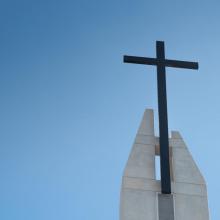synagogues
The Trump administration’s hard-line stance on undocumented immigrants is polarizing: People have responded with either “throw the bums out” or “have a heart.” But the question of whether faith communities can legally offer the undocumented physical sanctuary — sheltering them in churches, synagogues, and mosques to keep them from immigration authorities — is not so cut and dry.
The neighborhood has long been home to numerous historic and not-so-historic houses of worship of nearly every size and type. Here you can find congregations of Muslims, Hebrew Israelites, AMEs, Baptists, Presbyterians, Pentecostals, and everything else in between.
So who cares if a few churches have to be razed to make Harlem “great again,” right?
I do.

Image via Thanate Rooprasert/Shutterstock.com
First came the mayors of New York, Chicago, and Seattle declaring their cities “sanctuaries”, and saying they will protect undocumented immigrants from President-elect Donald Trump’s plan to deport them.
Then thousands of students, professors, alumni, and others at elite universities, including Harvard, Yale, and Brown, signed petitions, asking their schools to protect undocumented students from any executive order.
Now, religious congregations, including churches and synagogues, are declaring themselves “sanctuaries” for immigrants fleeing deportation.
Amid mounting protests in Europe against the Gaza conflict, political and religious leaders in the region have sharply denounced anti-Semitism within their borders.
“Anti-Semitic rhetoric and hostility against Jews, attacks on people of Jewish belief and synagogues have no place in our societies,” the foreign ministers of France, Germany, and Italy said in a statement Tuesday from Brussels.
Fears of escalating unrest are perhaps sharpest in France, home to Europe’s largest populations of Jews and Muslims. Many have roots in North Africa, and violence in the Middle East resonates strongly here. Thousands defied a government ban against Paris-area protests over the weekend, staging pro-Palestinian rallies that degenerated into violence.
Rabbi Sidney Schwarz, ordained in the liberal Reconstructionist tradition, sees a divide between generations of American Jews that could spell disaster for the community.
One generation he calls “legacy” or “tribal” Jews — those who built the national organizations and synagogues that have served for decades as the backbone of American Jewry. But reams of statistics show legacy Jews have enjoyed limited success attracting younger Jews.
The other is what he calls “covenantal” or “innovation sector” Jews, a younger generation that has founded a myriad of niche Jewish organizations — environmental, social justice and political — that can, in Schwarz’s vision, build on their parents’ work toward a more brilliant American Jewish future.
As the tenth anniversary of 9/11 approaches, many of us are wondering how best to honor the many victims of that tragedy and its aftermath.
Here in Cincinnati, my wife Marty's answer is inviting some of our friends to join us on a walk with some Muslim and Jewish families she invited by simply calling their congregations. She got the idea from my friends and me at Abraham's Path, who are sponsoring www.911walks.org to help people find or pull together their own 9/11 Walks all over the USA and around the world. The goal of these walks is simple: to help people honor all the victims of 9/11 by walking and talking kindly with neighbors and strangers, in celebration of our common humanity and in defiance of fear, misunderstanding, and hatred.



